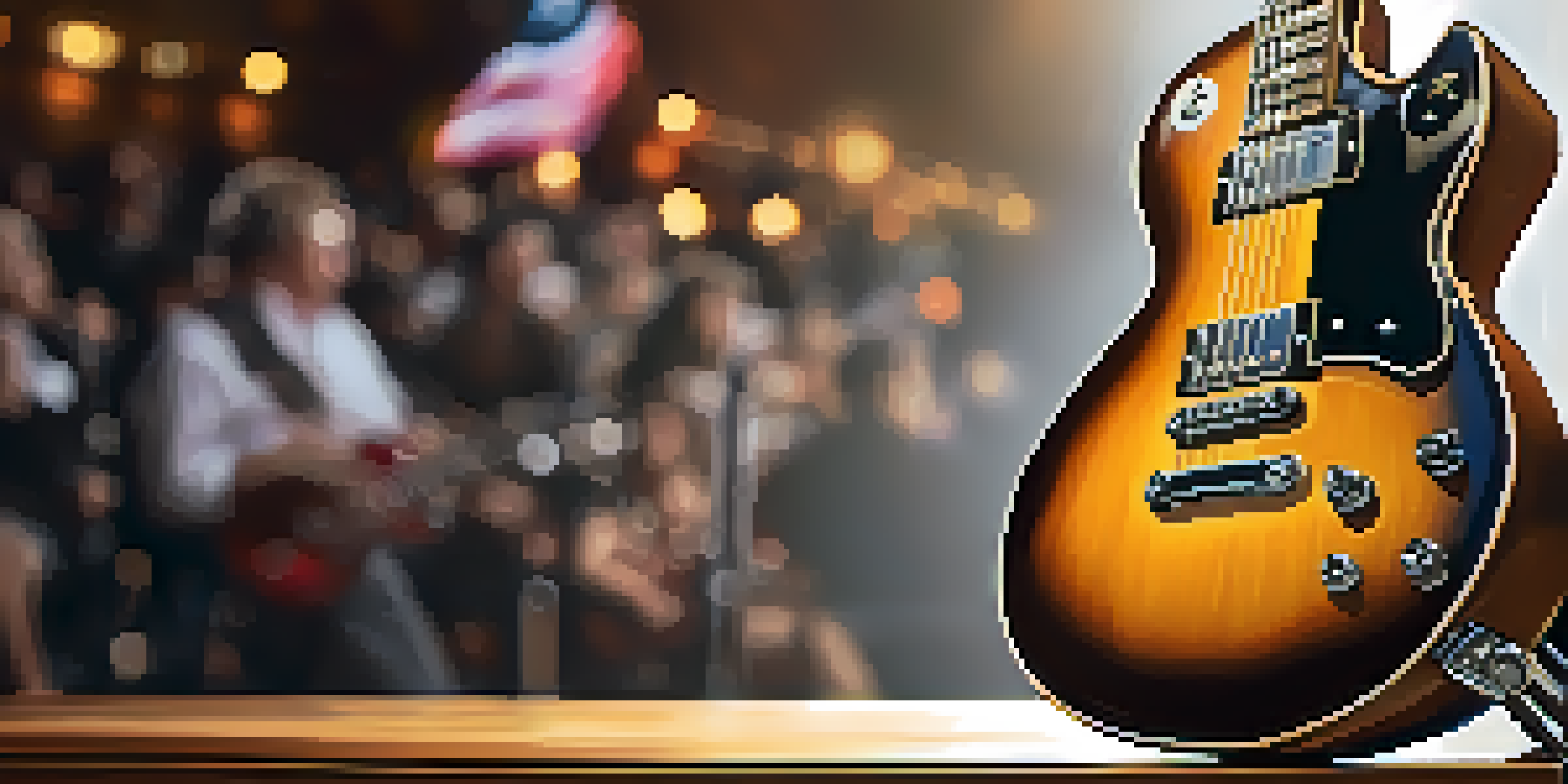Exploring Genres: Finding Your Unique Guitar Sound and Style

Understanding the Basics of Guitar Genres
Guitar music spans a variety of genres, each with its own vibe and techniques. From rock to jazz to blues, each genre offers a unique palette of sounds. Understanding these basics can help you identify what resonates with you, guiding your journey toward developing a personal style.
Music is the shorthand of emotion.
For instance, if you’re drawn to the heart-pounding riffs of rock, you’ll want to explore power chords and heavy distortion. Conversely, if the smooth melodies of jazz captivate you, diving into chord progressions and improvisation can open up new avenues. The key is to listen and immerse yourself in different styles to see what sparks your creativity.
Remember, the beauty of music lies in its diversity. By appreciating various genres, you can borrow elements from each, creating a sound that is genuinely yours. This exploration can serve as a foundation for your unique guitar identity.
Exploring Rock: The Backbone of Modern Guitar
Rock music is often seen as the cornerstone for many guitarists. With its powerful riffs and energetic solos, it’s no wonder that aspiring musicians gravitate towards this genre. Delving into rock can teach you essential techniques like palm muting and bending notes, which are crucial for enhancing your sound.

Consider listening to legends like Jimi Hendrix or Eric Clapton, whose styles have shaped rock music. Try to replicate their solos to understand their techniques, but don’t hesitate to inject your flair. Experimenting with different effects pedals can also help you find a unique tone that sets you apart from the crowd.
Explore Guitar Genres for Growth
Diving into various guitar genres enriches your musical journey and helps you develop a personal style.
Ultimately, rock is about attitude and expression, so don’t shy away from adding your personal touch. Whether it’s through songwriting or improvisation, your unique voice will shine through as you develop your skills.
Diving into Blues: Emotion and Expression
Blues guitar is rich in emotion and storytelling, making it a fantastic genre for expressing personal experiences. The use of the pentatonic scale in blues allows for fluid solos that can convey deep emotions. By learning the classic 12-bar blues progression, you can create a foundation for your improvisations.
The beautiful thing about learning is that no one can take it away from you.
Listening to artists like B.B. King or Stevie Ray Vaughan can inspire your style. Their ability to convey sorrow and joy through their playing can help you understand the emotional depth of the genre. Don't hesitate to experiment with bends and slides, as these techniques can add character to your sound.
As you explore blues, remember that it’s not just about technical proficiency. Emphasizing feeling and connection with your audience can elevate your playing. Use your guitar to tell your story, and soon you’ll find a unique voice within this genre.
Jazz Guitar: The Art of Improvisation
Jazz guitar is often associated with complex chords and improvisation, making it a challenging yet rewarding genre. To dive into jazz, it’s essential to familiarize yourself with different chord voicings and scales. The major and minor scales, along with the blues scale, serve as great starting points for your improvisational skills.
Listening to guitarists like Wes Montgomery or Pat Metheny can provide insight into the nuances of jazz playing. Their unique approaches to rhythm and melody can inspire your improvisation. Try playing along with jazz standards to hone your skills and develop your ear for this genre.
Experiment to Find Your Sound
Combining techniques and influences from different genres allows you to create a unique sound that reflects your identity.
Jazz is all about creativity and spontaneity, so don’t be afraid to take risks. Embrace the unexpected and allow your musical ideas to flow freely. By doing so, you can carve out a distinctive sound that resonates with your personality.
Folk and Acoustic: Strumming Your Feelings
Folk and acoustic guitar styles emphasize storytelling, making them perfect for conveying emotions and ideas. With simple chord progressions and fingerpicking techniques, folk music invites you to connect with your audience on a personal level. Learning to strum effectively can also enhance your rhythm and timing.
Artists like Bob Dylan and Joan Baez have shown how powerful lyrics and melodies can be when combined with a simple guitar accompaniment. Try writing your own songs by weaving together personal experiences and melodies that resonate with you. This practice can help you find your unique voice within the folk genre.
As you explore folk music, remember that authenticity is key. Don’t worry about being perfect; focus on expressing yourself. This genuine approach will help you carve out a unique sound that reflects your individuality.
Heavy Metal: Power and Precision
Heavy metal guitar is all about intensity, speed, and technical precision. The use of distorted tones and intricate riffs can create a powerful sound that captivates audiences. If you’re drawn to this genre, focus on mastering techniques such as alternate picking and tapping to enhance your playing.
Listening to guitarists like Metallica’s Kirk Hammett or Iron Maiden’s Dave Murray can provide insight into heavy metal’s intricacies. Their ability to meld melody with aggression is a hallmark of the genre. Don’t hesitate to experiment with different scales, such as the harmonic minor, which can add a unique flavor to your solos.
Embrace Emotion in Playing
Guitar genres like blues and folk emphasize storytelling, encouraging you to express your feelings and connect with your audience.
As you develop your skills in heavy metal, remember that it’s about pushing boundaries. Embrace the challenge of creating complex compositions while staying true to your musical identity. Your unique sound can emerge from this combination of technical proficiency and personal expression.
Combining Genres: Creating Your Signature Style
Exploring various genres can lead to the exciting possibility of blending them to create your own signature style. Mixing elements from different genres, like combining blues with rock, can result in a fresh sound that reflects your musical journey. This fusion allows you to draw from diverse influences while staying authentic to yourself.
As you experiment, don’t be afraid to borrow techniques and sounds that resonate with you. For example, you might incorporate folk storytelling into a metal riff or jazz improvisation into a rock solo. This creative freedom can set you apart from other guitarists, showcasing your unique approach.

Ultimately, the goal is to find what makes you feel alive when you play. Embrace your influences, but remember that your style evolves with you. The more you explore and experiment, the clearer your unique sound will become.
Practical Tips for Finding Your Unique Sound
Finding your unique guitar sound doesn’t have to be a daunting task. Start by regularly jamming with other musicians or playing along with your favorite tracks. This practice can help you discover new techniques and styles while refining your own sound. Don't hesitate to record yourself to track your progress and identify areas for improvement.
Be open to trying new things, whether it’s experimenting with different gear, tuning, or playing styles. Sometimes, a simple change, like using fingerstyle instead of a pick, can lead to unexpected results that enhance your sound. Attend workshops or online courses to learn from experienced musicians and gain inspiration.
Explore Diverse Guitar Genres
Understanding different guitar genres helps you discover your unique sound and influences.
Finally, trust your instincts. The path to finding your unique sound is a personal journey, and there’s no right or wrong way to go about it. Embrace the process, and remember that every note you play contributes to your musical identity.